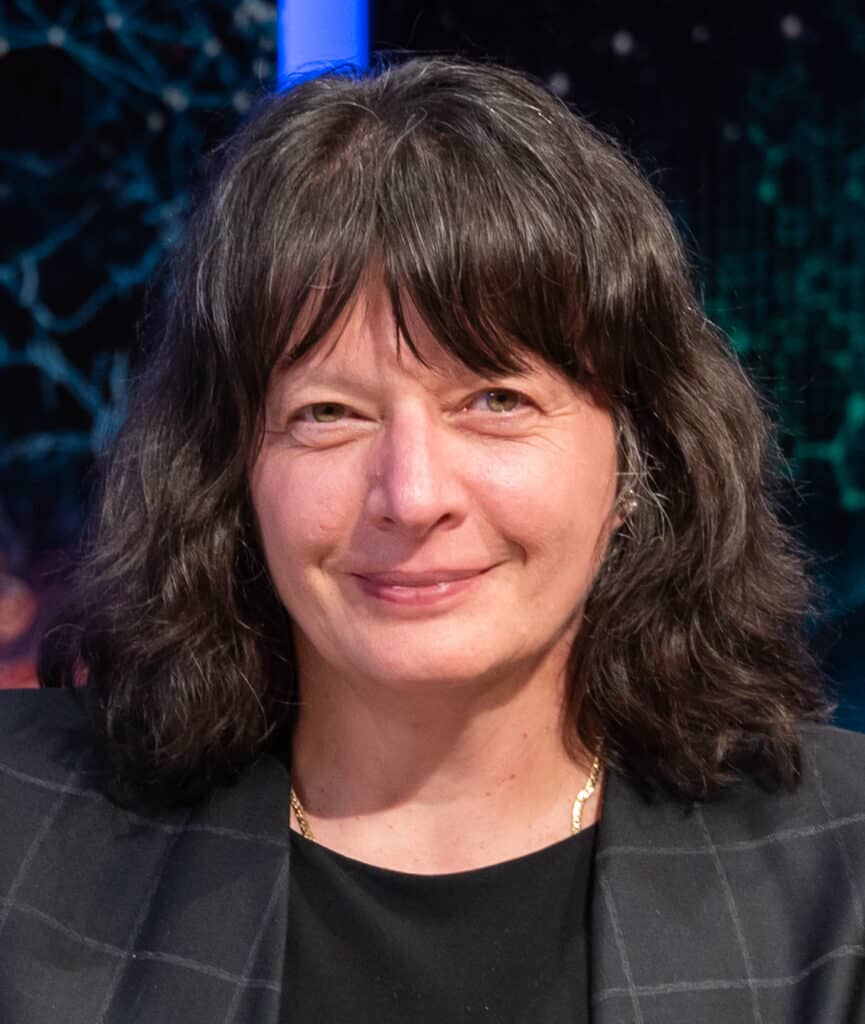
Imagine a world where breast cancer could be detected early before it even has a chance to start, and where doctors could target the specific biological signs that lead to tumor growth. What if breast cancer treatments could be individualized and tailored according to each person’s unique tumor profile?
Komen Scientific Advisory Board Member Dr. Kornelia Polyak, Ph.D., and her team are at the forefront of research that is bringing these exciting possibilities to the clinic. Dr. Polyak, a breast cancer researcher at Dana-Farber Cancer Institute and Professor of Medicine at Harvard Medical School, is dedicated to better understanding the drivers of tumor initiation and progression, as well as identifying external factors that can contribute to breast cancer risk.
Identifying Early Precursors to Breast Cancer
Dr. Polyak was first drawn to breast cancer research by her desire to better understand the progression and evolution of breast tumors.
“I was very interested in breast tumor progression, and that basically includes that we have an interest in risk prediction — trying to understand why some women get breast cancer and why it progresses in some and not in the others,” she says.
“Many times, I’ve been told that prevention is not easily feasible in the clinic, but I feel like we now have some approaches that are feasible. I see the difficulties, but we don’t want to give up.”
Since then, Dr. Polyak has been studying the breast tissues of high-risk and low-risk women to better understand their differences on a cellular and molecular level. This includes her study of why some women have ductal carcinoma in situ (DCIS), an early-stage breast cancer, and what determines whether it will progress or not. Dr. Polyak is especially interested in the cell precursors or “progenitors” from which tumors may grow, and how they are different between high-risk and low-risk women.
Through these studies, Dr. Polyak and her team have found that certain cell types that become pre-cancerous progenitors are found more often in women who are at a high risk for breast cancer, and decreasing these progenitors could be a new treatment strategy for high-risk patients. This is an exciting discovery that could forever change the landscape of breast cancer prevention.
“If we could basically decrease the progenitors from which the cancers develop, that could be a very effective way to prevent breast cancer,” says Dr. Polyak. “We’re trying to figure out a safe and easy way to do that, and it looks promising.”
Uncovering Novel Risk Factors
As Dr. Polyak and her team learn more about the biological precursors that lead to tumor progression, they are also identifying other unique factors that can influence breast cancer risk.
For example, recent data has shown that early full-term pregnancy decreases the risk of ER-positive breast cancer. Dr. Polyak and her colleagues investigated the normal breast tissues of women who have not had a pregnancy and women who have had full-term pregnancy and found that the properties and frequencies of progenitor cells are different between these two groups of women. When compared to those who have not had a pregnancy, the women who had full-term pregnancies had fewer progenitors.
“What we are seeing (in a breast) is these progenitors seem to be very different, and that’s very relevant for cancer risk, because if you have fewer of the progenitors that are able to proliferate, this means that you have a lower risk,” says Dr. Polyak.
Treating the Whole Patient
As doctors turn to personalized medicine to better treat breast cancer, it may soon be possible to create individualized treatments that take these complex factors – from progenitors to unique risk factors – into account. Through these exciting possibilities, researchers are closer to not only finding better treatments for breast cancer, but also finding ways to prevent it from ever starting.
“Many times, I’ve been told that prevention is not easily feasible in the clinic, but I feel like we now have some approaches that are feasible,” says Dr. Polyak. “I see the difficulties, but we don’t want to give up.”
Dr. Polyak has been a member of Komen’s Scientific Advisory Board since 2020, but Komen has been supporting her research into breast cancer progenitors since 2010. She is also a former Komen Scholar.
“I love to support organizations that are driven by the patients and want to serve patients in terms of care, prevention and health in general,” says Dr. Polyak. “And Komen is one of the leading organizations that really does that.”



